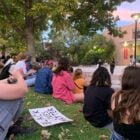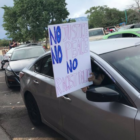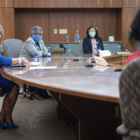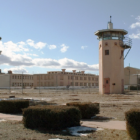Hundreds of nonviolent New Mexico prison inmates, including people convicted of drug possession, remained behind bars last week, even as COVID-19 killed its first state prisoner and infected one in three inmates at the Otero County Prison Facility near the southern border. Gov. Michelle Lujan Grisham, who has won national praise for how she’s led New Mexico through the pandemic, is facing questions over why she hasn’t moved more aggressively to ensure more of the state’s 11 prisons don’t become viral hotspots.
Since March, her administration has freed about 50 inmates — less than 1% of the state’s prison population — through an April 6 order that requires her to commute sentences rather than using a law already on the books that would allow hundreds of prisoners to be released early.
The minimal prisoner releases pale next to what some states have done to ease crowding in — and the 30% reduction New Mexico counties have accomplished in the state’s 27 jails. Lujan Grisham’s approach has given some pause, especially given the first-term Democrat’s advocacy for legalizing recreational cannabis and her recent creation of a Council for Racial Justice in response to protests that spilled into New Mexico streets over the killing by police of George Floyd, a black man in Minneapolis.
About one quarter of those locked up in New Mexico’s prisons are in for nonviolent drug offenses, including many, some long-time criminal justice watchers say, who were prosecuted for possessing marijuana — an offense that would be legal if New Mexico green-lighted recreational cannabis as Lujan Grisham has lobbied. Hispanic and black people are disproportionately incarcerated in New Mexico, as they are nationwide.
State Sen. Jerry Ortiz y Pino, D-Albuquerque, believed the pandemic represented a “golden opportunity” for the Lujan Grisham administration to try a different approach besides prison, but he’s “very disappointed,” he said.
“They basically haven’t dented the prison population, and now there is an outbreak which anyone could have predicted,” Ortiz y Pino said. “I have been concerned about why we have these kinds of low-level drug offenders locked up for a long time, and I am even more concerned now.”
Mark Donatelli, a longtime criminal defense and civil rights lawyer based in Santa Fe, wants to know why the governor hasn’t released prisoners using the Community Corrections Act.









